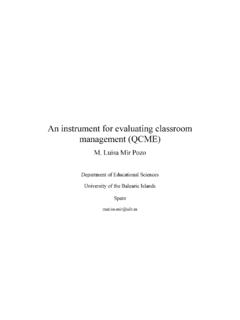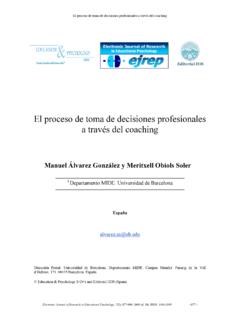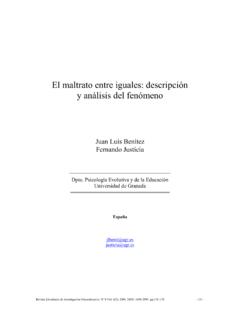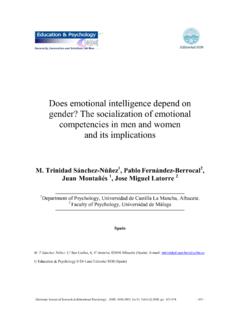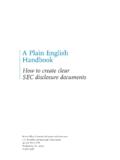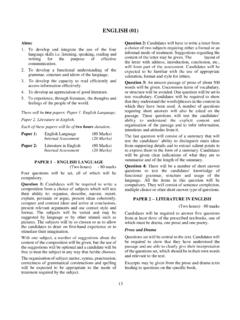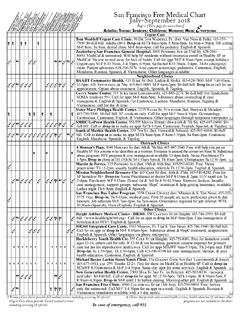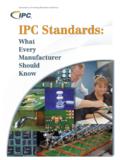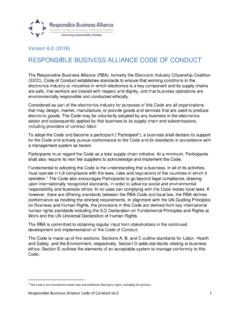Transcription of Paul Sander and Lalage Sanders
1 Measuring confidence in academic study: A summary report paul Sander and Lalage Sanders University of Wales Institute, Cardiff U. K. Measuring confidence in academic study: A summary report. Electronic Journal of Research in Educational Psychology and Psychopedagogy, 1 (1), 1-17 . ISSN: 1696-2095 - 2 - ABSTRACT Introduction. Guided by the work of Bandura on self-efficacy, this study seeks to determine the extent to which differences in students' expectations of higher education could be ex-plained by differing levels of confidence. Method. An Academic Confidence Scale (ACS) was constructed and used for a survey of level one students, to explore differences in confidence between two very different student groups.
2 One group was further tested for their confidence later in the year and at the same time; they completed a Ladder of Aspiration (LofAsp), to validate the Academic Confidence Scale. With these data, the ACS could be explored further for underlying factors. Results. Factor analysis of the ACS yielded six factors (Studying, Understanding, Verbalis-ing, Clarifying, Attendance and Grades). The LofAsp provided validation of the ACS. From the LofAsp, a small group that rated themselves lower than the national average was identi-fied. This group was interesting both in terms of ACS scores and academic performance. ACS scores showed a significant reduction over time. Discussion. A comparison of the ACS scores between the two student groups suggests that confidence could only be responsible to a small extent for differences in students' expecta-tions of higher education.
3 The reduction in ACS scores indicates that ACS is affected by stu-dent performance, rather than affects student performance. It also asks questions about stu-dents ability to reason with statistical data as well as their views on their likely performance on their course. Keywords: Self-efficacy, confidence, university, students paul Sander and Lalage Sanders Electronic Journal of Research in Educational Psychology and Psychopedagogy, 1 (1), 1-17. ISSN: 1696-2095 - 3 - INTRODUCTION Confident, according to the Oxford English Dictionary (1989) is having strong belief, firm trust, or sure expectation; feeling certain, fully assured, self-reliant, bold; sure of one-self, one's cause, etc.; having no fear of failure.
4 Experience tells us that confidence differs between people in the same situation and that people have differing levels of confidence in different situations. Thus someone who is highly confident in a familiar setting, for example, may lose confidence in an unfamiliar and challenging environment. The study reported here originates firstly from the work by Bandura ( 1977, 1993) on concept of self-efficacy, and secondly from a study on students perceptions of university teaching ( Sander et al, 2000). This research details the development of a scale to measure one specific form of confidence, namely academic confidence. Self-efficacy has been defined (Bandura, 1986, page 391), as people s judgements of their capabilities to organise and execute courses of action required to attain designated types of performance and stems from four sources: mastery experience, vicarious experience, ver-bal persuasion and physiological states (Bandura, 1977).
5 Self-efficacy can also be seen as the confidence that people have in their ability to do the things that they try to do (Pajares, 2000). Thus self-efficacy can be seen as a product of a reflexive loop between the individual and their environment: successful experience resulting in higher levels of self-efficacy. Self-efficacy scales have been applied to educational research, primarily in studies of academic motivation and self-regulation (Pajares, 1997, 2002). Self-efficacy influences the choices people make in specific situations, such as whether to start a task. It influences the effort people put into tasks and their persistence, especially when the going gets tough . Furthermore, self-efficacy has not only a psychological effect, but also a physiological effect, affecting, for instance, anxiety levels (Pajares, 2002).
6 In summary, self-efficacy research has helped to tease out the contributions that ability and self-confidence in one s ability makes to academic success and in careers beyond education (Crozier, 1997). Why develop a measure of academic confidence? There is, therefore, a wealth of empirical evidence showing that self-efficacy affects academic performance, as part of its general effect on behaviour. However this blanket effect may obscure some more specific differences that could be applicable to educational settings, Measuring confidence in academic study: A summary report. Electronic Journal of Research in Educational Psychology and Psychopedagogy, 1 (1), 1-17 . ISSN: 1696-2095 - 4 - in particular in higher education, where the autonomy and independence of the student are essential to success (witness the key components of the contemporary interest in the concept of 'graduateness'.)
7 In this context, a new construct distinct from its parent concept, self-efficacy, was suggested, a construct that we termed academic confidence . Originally, academic confidence was hypothesised as explaining some interesting group differences in an earlier study ( Sander et al, 2000). This study examined the expecta-tions of two groups of UK university students; one group comprised medical students in a traditional university and the other psychology students in a new university. One aspect of the results was the striking differences in reasons given by students for not liking role-play and student presentations as methods of teaching. Essentially, the medical students were wor-ried that these were not effective methods, whereas the psychology students were worried about their own competence to do them (see also Sander and Stevenson 2002, Stevenson and Sander , 2002).
8 The possibility of academic confidence as an explanation for this difference arose from an examination of the differing entry profiles of the two groups. The medical stu-dents had an average A-level point score of , in contrast to for the psychology stu-dents, (using the standard pre 2002 UCAS formula for assigning A level points, where A =10, B=8, C=6, D=4, E=2 and AS grades assigned half value points an A grade AS level =5). Academic confidence is conceptualised as being how students differ in the extent to which they have a strong belief, firm trust, or sure expectation of what university has to of-fer. As part of its parent concept, self-efficacy, academic confidence may stem from the same four sources: mastery experience, vicarious experience, verbal persuasion and physiological states.
9 It is likely to be subject to change as experience impinges upon expectation. The question becomes to what extent may it predict the nature of that experience? McLean (2001), in a study of medical students found that learning style was clearly associated with academic performance. How might academic confidence interact with learning styles? Could it have a role to play in predicting academic performance? Academic confidence, therefore, is proposed as a mediating variable between the indi-vidual s inherent abilities, their learning styles and the opportunities afforded by the academic environment of higher education. In order to explore this further it was necessary to develop an instrument to measure this specific construct.
10 As the notion of academic confidence has its theoretical foundations paul Sander and Lalage Sanders Electronic Journal of Research in Educational Psychology and Psychopedagogy, 1 (1), 1-17. ISSN: 1696-2095 - 5 - in Bandura s work on self-efficacy, the guidelines for measuring self-efficacy are taken to be equally applicable in measuring academic confidence. METHOD Level 1 students were surveyed at two points in the academic year. In induction week (time 1), psychology students and medical students, at two different universities, completed an Academic Confidence Scale (ACS, see appendix 1) that had already been tested for ac-ceptable internal reliability. At the end of the Easter term (time 2), the same group of psy-chology students were invited to complete the ACS for a second time, along with a validation task, the Ladder of Aspiration (LofAsp, see appendix 2), based on the work of Cantrill (1965) and Sanders (1987).

